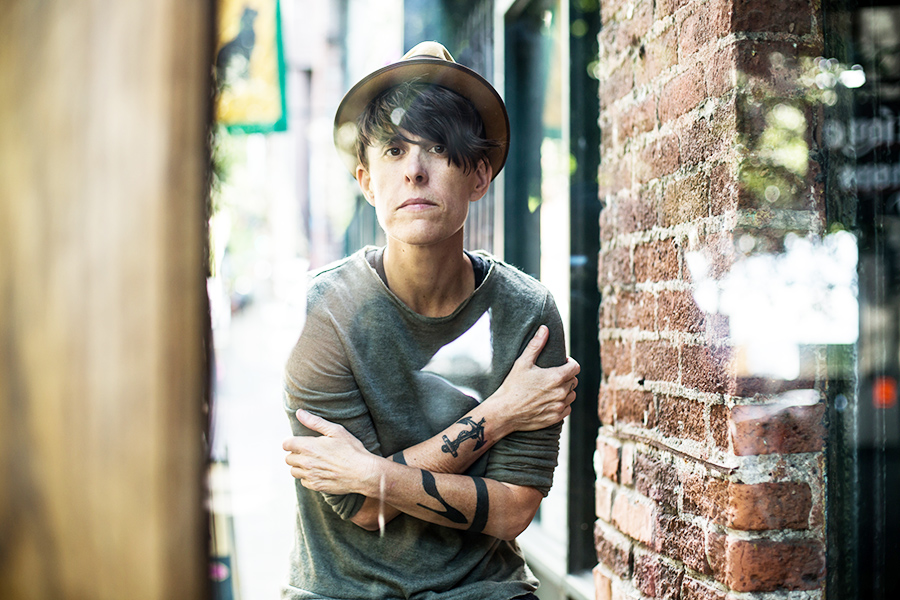Fifteen years before gender-neutral pronouns and an overall rejection of gender binaries were a source of daily conversation, provocative Colorado-based poet/activist/recording artist Andrea Gibson was making that part of their aesthetic conversation; one that includes daring writings and stirring songs about identity, fidelity, changing norms, social reform, love, sex and all manner of LGBT struggles.
Currently, the spikey Gibson (that goes for the words and the hair) has two immensely quotable projects in the pocket-sized “Take Me with You” volume of poems, along with a 2017 album, “Hey Galaxy.” To go with the hard stuff, Gibson plays a rare local tour date, at The Fillmore’s Foundry, 8 p.m. Jan. 23.
PGN: You do something on “Your Life” from the new album that is radical in its simplicity and message. You tell people to grow up and not face life as easy and always amenable, to find and face life with its occasional struggles. How and why did you come to this?
AG: I don’t think it was a new idea to me — that life would be difficult and gorgeous all at once. But I do think my lens opened a bit when I wrote the line, “You want a hard life that is YOUR life.” Writing that woke a tenderness in me towards myself and towards the LGBTQ community. It sparked a new sense of deep gratitude for my younger self and the choices that young person made so I could have the life I have today. I’m remembering, just now, that the first draft of that poem was a thank-you letter. And it still, in many ways, is exactly that.
PGN: How has turning 40 changed/switched on your writing as a poet or as a musical performer in a different fashion than,say, at 39?
AG: The biggest difference I notice is how much more invested I am in curiosity. When I was younger, I really wanted to be someone who knew the answers. I wanted my poems to be answers. Now I want my poems to encourage more wonder, more questioning. I don’t want the poem to be the solution. I want the poem to spark a journey — and a different journey in each person who hears it.
PGN: Everything you seem to do, or a lot of what you write, that might be rooted in reality, say, the “beating yourself up” idea of “Take Me with You” — quickly evolves into something spacey and celestial. Why is that? Why is space the place for you presently and what motivated such a move into the heavens?
AG: Some work that I plan on putting out after these current projects is the answer to this question. I’ll say, for now, that space — and all of its many meanings, is always on my mind. That our solar system is only a dot inside of a dot inside of a dot. That our galaxy is so relatively tiny, it could be one of the 900-billion atoms in a grain of sand on the beach of the universe. To stay sane, I have to keep track of the immenseness — and to hold all of that without then assuming the smallness of any of us. That we are gigantic still is what awes me. And awe fuels my will to be part of making this planet of ours as loving of a place as possible.
PGN: I’m impressed by your wealth of subject matter — your diversity — as much as I am your turns of phrase. That you touch on things such as how the U.S. and its bureaucracy touches on lost souls from war veterans to those sexually abused. As a writer and as a person, is that rooted at all in your upbringing, your family or religion?
AG: Much of my extended family was/is in the military. But my writing on that topic began with meeting an activist in Denver, whose son was at the time serving in Iraq. The two shared the letters they were writing to each other with me and asked that I write something about their experience — which is where the poem “FOR ELI” came from. Both Eli and his mother are now fierce activists who continue to inspire me and many others. And as for sexual assault, I write about sexual assault because I was sexually assaulted and because the majority of people in my life have been sexually assaulted and because everything in this culture has historically told us to shut our mouths about it. I’ve been overwhelmingly inspired by the #MeToo movement as of late and feel hope around this issue for the first time in my life.
PGN: It has been 15 years since your first album and 12 since your first whole volume of poetry. Considering the prism of your newest creations, how do you view/hear those initial morsels?
AG: It can be a pretty intense experience to look back at my earliest work. My heart and politics change so quickly that it’s rare for me to record an album or publish a book and not find at least one glaring problem in the politics of a poem or two by the time the project’s gone to print. But, I can look at that one of two ways. I can say, “I hate myself for not knowing better at the time.” Or I can say, “Thank God, I’m learning fast enough to recognize how many mistakes I’m making.” These days, I choose to focus on how quickly I’m learning, as being compassionate with myself dominoes into me being more compassionate with others.

